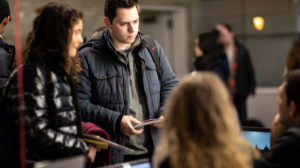Congratulations, you just got into your dream study abroad program- but what’s next? Now, having been to Australia for only a few days, I cannot be your GEO advisor. But I do want to share with you guys a few tips and things I wish I had considered before coming here.
Figuring out how to register for classes
Studying abroad is such an exciting experience- you are going to live in a new country, try new things, and meet people from all around the world. Among all these things, classes are probably the last thing you want to think about. But it’s super important to make sure you are taking the classes you need since you don’t want to pay tuition for a 4-month vacation abroad. Now I know most of you have probably submitted your courses to your academic advisors through myNEU, but it’s super important to remember to register for classes at your host university. Every university has its own course registration system, so don’t just wait around for your time ticket to show up in your email inbox. For example, my host university, the University of Queensland, has a very different system than Northeastern. Course registration here has three parts: enrollment, allocation, and adjustment. During the enrollment period, you can register for the courses you want to take but you can’t select the course sections. During the allocation period, you can select the course sections, but you do so by putting down your preference for each section. Then in the beginning of the adjustment period, you can view your “allocated” class times and make changes to either the course you registered or the section you were allocated to. But there’s no guarantee that you will get into the section of your first choice since it could be full or clash with your other classes. Another thing to keep in mind is that registration times are also very different for each university and your host university may not email you to remind you about course registration. So make sure to check your host university’s academic calendar before the start of the semester.
Finding a place to live
Another important thing to sort out before you go abroad is finding a place to live. This may not seem like a complex process, but there are many things to consider- location, price, facilities, roommates, etc. There are three main options when it comes to housing: homestay, dormitory, and off-campus accommodation, each of which will have a different impact on your study abroad experience. Usually, your host university will be a pretty good resource for helping you find housing. My host university was very helpful and sent us a list of recommended accommodations with locations and prices so it was pretty easy for me to find out what my options were. But since I had the list, I didn’t feel the need to research more about these places. After clicking on some of the on-campus housing options, I quickly settled on staying at the International House, one of the residential colleges at UQ. I knew I wanted to live in a dorm because I wanted to be close to campus and be able to meet other students. I assumed the dorms at UQ would be similar to Northeastern, but I was totally wrong. Soon after I arrived, I realized that the residential colleges here were run like greek organizations in the States and the facilities were different from Northeastern dorms. I had to wake up at 6AM to participate in team bonding activities and there was no air conditioning in my room. Even though it was a bit of a shock, I still had a good time and was able to bond with people over complaining about the heat and waking up early. But this kind of experience was not for everyone. Some people I lived with moved out since they weren’t interested in this type of experience and wanted to be more independent. So it’s super important to research the place you’ll be staying at so you know what you are getting into and can avoid having to deal with more troubles later.
Connecting with other exchange students
A large part of my anxiety about studying abroad comes from worrying about whether I would be able to make friends. I believe many of you will be in the same boat. If you want to meet people before you even go abroad, GEO is a very good resource and is super helpful in connecting you with other study abroad students at NEU. You’ll get an email list of people who are going to the same destination as you. You’ll also be invited to the study abroad orientation, where you can meet with other study aboard students in person. Your host university can also help you connect with other exchange students. My host university made a Facebook group for all the incoming exchange students for this semester, so even though I was the only NEU student going to UQ, I was still able to meet other exchange students. If you were added to a Facebook group like I did, don’t be afraid to initiate conversations. Coming to Brisbane, I really wanted to go to the beach and learn how to surf. So I asked in the Facebook group if anybody would be interested. I was nervous at first and thought that nobody was going to respond, but a good amount of people actually responded. We now have a group chat and are planning beach trips together, so I am really glad that I took the initiative.
Be flexible
One of the most important things to keep in mind when you go abroad is to be open-minded. No matter how well you prepare and plan your study abroad trip, something will go unexpectedly. I for sure never expected to have no AC or have to do a group dance with my dormmates at 7 in the morning. Changes tend to make us uncomfortable and it’s easy to get angry and frustrated when you face unfamiliar and unexpected situations. But these situations will allow you to grow in unexpected ways. My first few days have been full of unexpected situations, but I am still looking forward to what will come next.










